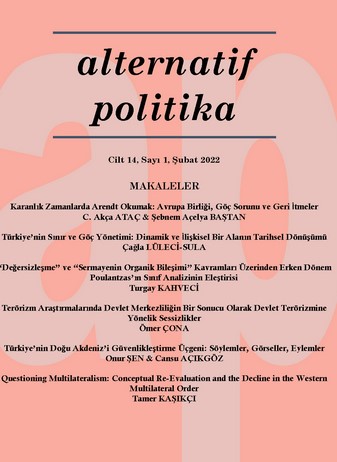“DEĞERSİZLEŞME” VE “SERMAYENİN ORGANİK BİLEŞİMİ” KAVRAMLARI ÜZERİNDEN ERKEN DÖNEM POULANTZAS’IN SINIF ANALİZİNİN ELEŞTİRİSİ
CRITICISM OF THE CLASS ANALYSIS OF EARLY POULANTZAS ON THE CONCEPTS OF “DEVALUATION” AND “ORGANIC COMPOSITION OF CAPITAL”
Author(s): Turgay KAHVECİSubject(s): Political Philosophy, Structuralism and Post-Structuralism, Marxism, Labor relations, Politics and society, Culture and social structure
Published by: Rasim Özgür DÖNMEZ
Keywords: Marxism; Classes; Historicism; Structuralism; Nicos Poulantzas;
Summary/Abstract: It can be said that the emergence of class theories has a parallel history with the development of the Industrial Revolution and the establishment of capitalist production relations. However, this development adventure does not deny the existence of classes before capitalism from a factual point of view, does not fix them on the established order of capitalism. The essence of Marxist class theory is the idea that the dynamics of the historical process are class struggles. In this study, first of all, the class definitions of the Marxist tradition from early Marxism to Neo-Marxism and the social historiography of labor are discussed in a general framework. Traditional Marxism and the trends in the literature that followed it were examined. Then, with the book “Political Power and Social Classes”, a special title was opened for the early period Poulantzas, and his approach to the state, social formation and classes was conveyed. In the class analysis Poulantzas put forward in his early texts, the inclusivity of the notions of productive labor/unproductive labor was discussed, and the classifications of the working class, traditional and new petty bourgeoisie were examined. The main argument of this research is the claim that Poulantzas's class analysis during his early period, excluding his late period from structuralist-functionalism to relational state theory, could not respond to economic notions such as devaluation and the organic composition of capital.
Journal: Alternatif Politika
- Issue Year: 14/2022
- Issue No: 1
- Page Range: 66-105
- Page Count: 40
- Language: Turkish

